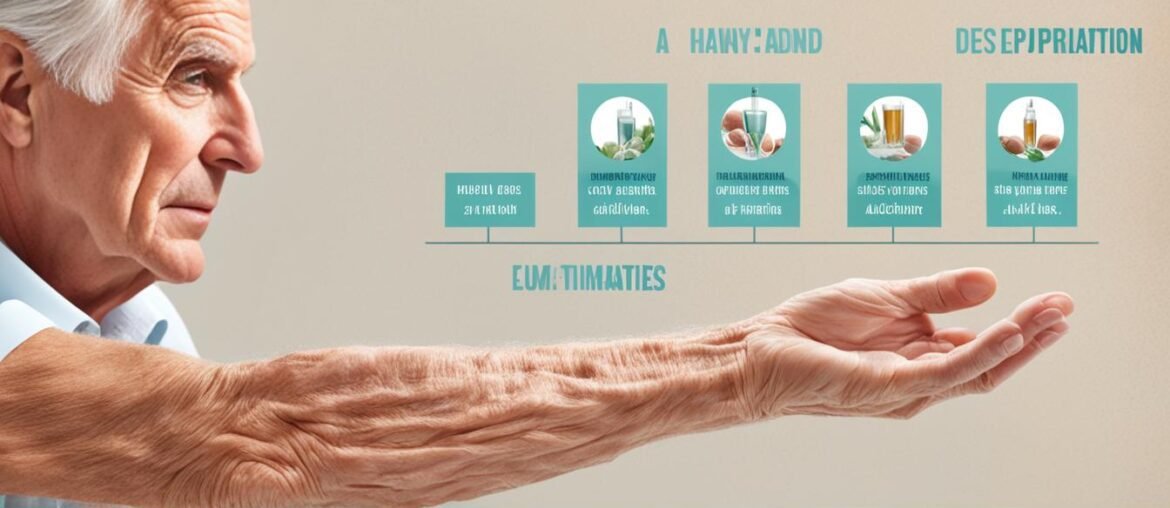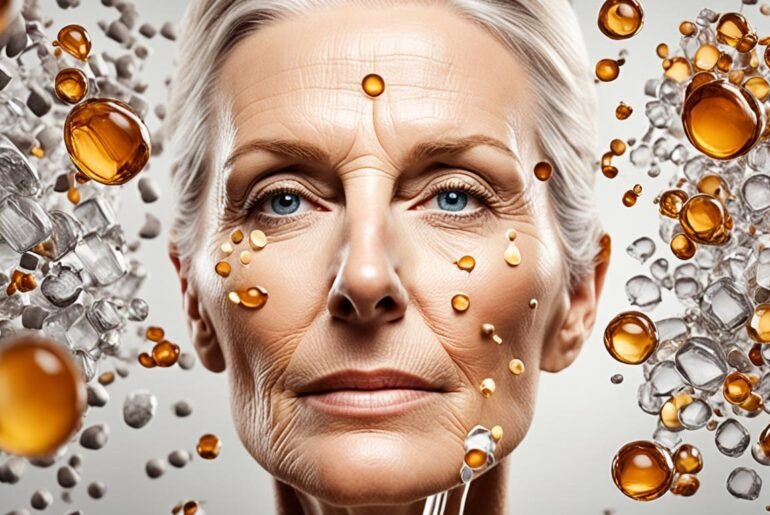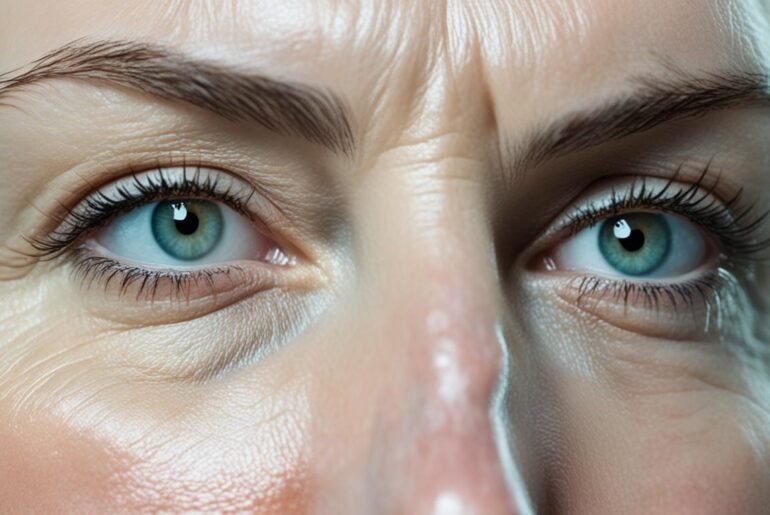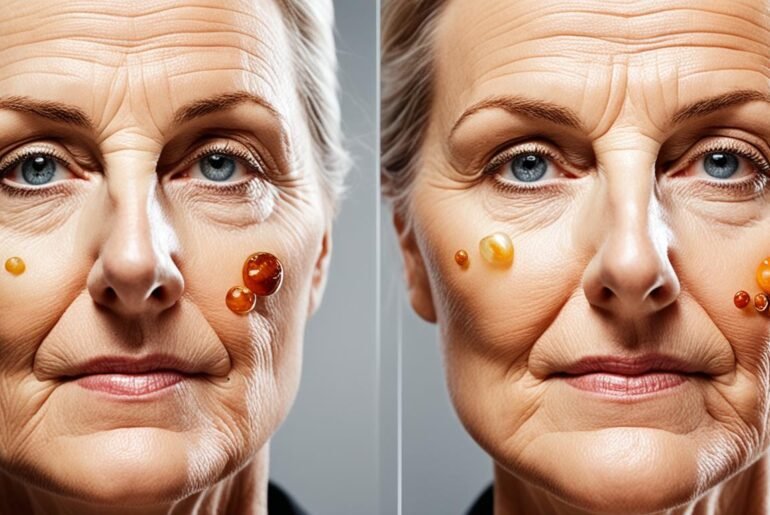Did you know that alcohol can have a significant impact on the aging process of your skin? The effects of alcohol consumption go far beyond the temporary hangover; they can leave lasting damage on your complexion. Alcohol dehydrates the skin and robs it of essential nutrients, leading to dryness, wrinkles, and an overall aged appearance. But what if I told you that by quitting alcohol, you can reverse these effects and achieve healthier, more youthful skin?
Quitting alcohol allows your skin to rehydrate and regenerate, resulting in a brighter and healthier complexion. It can also reduce the risk of skin conditions like rosacea and empower your skin’s ability to fight off infections. So, if you’re looking to improve your skin age and overall skin health, giving up alcohol could be the game-changer you’ve been waiting for.
Key Takeaways:
- Alcohol dehydrates the skin and deprives it of essential nutrients, leading to dryness, wrinkles, and an aged appearance.
- Quitting alcohol can rehydrate and regenerate the skin, resulting in a brighter and healthier complexion.
- Alcohol consumption increases the risk of skin conditions like rosacea and reduces the skin’s ability to fight off infections.
- Giving up alcohol can improve skin age, reduce the risk of skin conditions, and enhance skin’s natural defenses.
- Consider quitting alcohol as a step towards achieving youthful and healthy-looking skin.
The Effects of Alcohol on Skin Health
Alcohol consumption has a significant impact on the health of your skin. When you drink alcohol, it dehydrates your skin, leading to dryness and increased visibility of pores. This can result in a dull and unhealthy appearance. Additionally, alcohol deprives your skin of essential nutrients, which can contribute to the formation of wrinkles and an overall lackluster look.
Moreover, alcohol consumption can increase the risk of skin conditions like rosacea and compromise your skin’s ability to fight off infections. These negative effects on skin health are particularly concerning when it comes to aging, as alcohol accelerates the aging process.
“Alcohol dehydrates your skin, leading to dryness and increased visibility of pores. It deprives your skin of essential nutrients, which can contribute to the formation of wrinkles and an overall lackluster look.”
However, there is good news. Quitting alcohol can reverse these detrimental effects and significantly improve the health of your skin. When you cease alcohol consumption, your skin is given the opportunity to rehydrate and regain its natural moisture balance. This can lead to a brighter and more vibrant complexion.
Furthermore, quitting alcohol allows your skin to receive the necessary nutrients it needs for optimal health and rejuvenation. With improved nutrition, your skin can regain its elasticity and smoothness, reducing the appearance of wrinkles and fine lines.
Quitting alcohol also decreases the risk of skin conditions such as rosacea, as alcohol consumption can trigger and exacerbate these conditions. By eliminating alcohol, you are creating a healthier environment for your skin, allowing it to function properly and maintain its natural defenses against infections.
Overall, when you quit alcohol, you’ll notice a significant improvement in the health and appearance of your skin. It’s a positive lifestyle choice that can help you achieve a youthful and radiant complexion.
Skin Health Benefits of Quitting Alcohol:
- Improved skin hydration
- Reduced visibility of pores
- Enhanced delivery of essential nutrients
- Decreased risk of skin conditions like rosacea
- Enhanced skin’s ability to fight off infections
- Reduced appearance of wrinkles and fine lines
By quitting alcohol, you’re giving your skin the opportunity to thrive and reach its full potential. Say goodbye to the negative effects of alcohol and hello to healthier, more radiant skin!
The Relationship Between Alcohol and Skin Aging
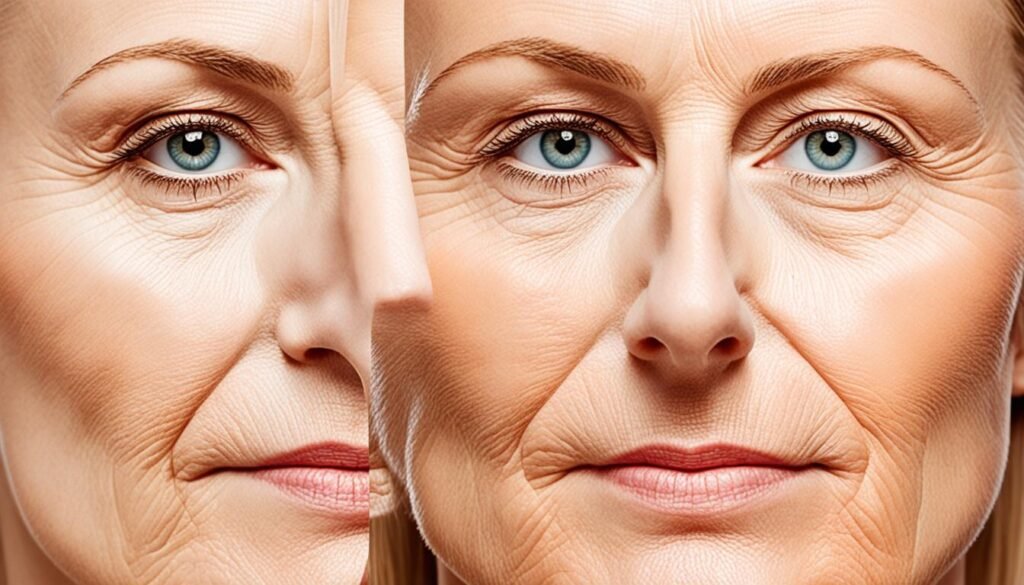
Alcohol consumption accelerates the aging process of the skin. It reduces cell renewal and leads to the accumulation of dead cells, resulting in a dull complexion. Alcohol is also a diuretic, causing dehydration and contributing to dryness, loss of elasticity, and the appearance of fine lines and wrinkles. However, quitting alcohol allows for skin rejuvenation, as the body can rehydrate and the cell renewal process can resume, leading to a healthier and more youthful appearance.
To understand the impact of alcohol on skin aging, it’s essential to delve into the mechanisms at play.
- Reduced Cell Renewal: Alcohol inhibits the production of new skin cells and disrupts the natural turnover process. This leads to the accumulation of dead cells on the skin’s surface, dulling its appearance and contributing to a lackluster complexion.
- Dehydration: Alcohol is a diuretic, which means it increases urine production and can dehydrate the body. This dehydration affects the skin, leaving it dry and parched. Over time, this can lead to a loss of elasticity and the formation of fine lines and wrinkles.
- Damage to Collagen and Elastin: Collagen and elastin are proteins responsible for maintaining the skin’s firmness and elasticity. Alcohol can damage these proteins, causing the skin to sag and lose its youthful appearance.
- Impaired Nutrient Delivery: Alcohol deprives the skin of essential nutrients, such as vitamins and antioxidants, that are necessary for its health and vitality. This deficiency can further contribute to skin aging and diminish its natural glow.
By quitting alcohol, individuals can allow their skin to undergo a rejuvenation process. The body can rehydrate, and the skin’s cell renewal process can restart, resulting in a healthier, more vibrant complexion. It’s important to note that the reversal of alcohol-related skin aging is a gradual process that requires time and consistency.
The benefits of quitting alcohol for skin rejuvenation go beyond the surface.
“Quitting alcohol allows the skin to heal and recover from the daily stressors and dehydration caused by alcohol consumption, resulting in improved overall skin health.” – Dr. Jane Roberts, Dermatologist
Quitting alcohol not only improves skin appearance, but it also positively impacts skin health in the long run. The body can detoxify, eliminating harmful toxins and allowing the skin to regain its natural balance. With improved hydration, nutrient delivery, and collagen production, the skin becomes more resilient, youthful, and better equipped to fight off signs of aging.
Image:
The Impact of Alcohol on Skin Appearance
Alcohol consumption can have a significant and negative impact on the appearance of the skin. The effects of alcohol on the skin go beyond just dehydration and dryness. Many people underestimate the toll that alcohol takes on the skin, leading to a variety of issues that can affect its overall appearance.
Inflammation and Dehydration: One of the main impacts of alcohol on the skin is inflammation and dehydration. Alcohol is a diuretic, which means it increases urine production and leads to excessive fluid loss from the body. This dehydrates the skin, making it appear dull, lackluster, and prone to dryness. Additionally, alcohol consumption can cause inflammation in the skin, leading to redness, puffiness, and an uneven complexion.
Sagging and Increased Pore Visibility: Alcohol can also contribute to sagging skin and increased pore visibility. Alcohol weakens the skin’s elasticity, causing it to become less firm and more prone to sagging. This can result in the appearance of fine lines, wrinkles, and a loss of facial definition. Furthermore, alcohol can cause the pores to become more visible, giving the skin a rough texture and an overall aged appearance.
Skin Conditions: Alcohol consumption can exacerbate existing skin conditions and even contribute to the development of new ones. Conditions such as rosacea and couperose, which involve redness, flushing, and visible blood vessels on the face, can be aggravated by alcohol. The inflammatory nature of alcohol can trigger flare-ups and make these conditions more difficult to manage.
Sebum Production and Breakouts: In women, alcohol consumption can stimulate excess sebum production. Sebum is the oil produced by the sebaceous glands, and when produced in excess, it can clog pores and lead to breakouts. This excess sebum production can worsen existing acne or contribute to the development of new acne lesions.
To illustrate the impact of alcohol on skin appearance, here is a table summarizing the effects:
| Effects of Alcohol on Skin Appearance | Description |
|---|---|
| Inflammation and Dehydration | Causes redness, puffiness, and dryness |
| Sagging and Increased Pore Visibility | Leads to the appearance of fine lines, wrinkles, and visible pores |
| Skin Conditions | Aggravates rosacea, couperose, and other inflammatory skin conditions |
| Sebum Production and Breakouts | Stimulates excess oil production, leading to acne breakouts |
Benefits of Quitting Alcohol for Skin
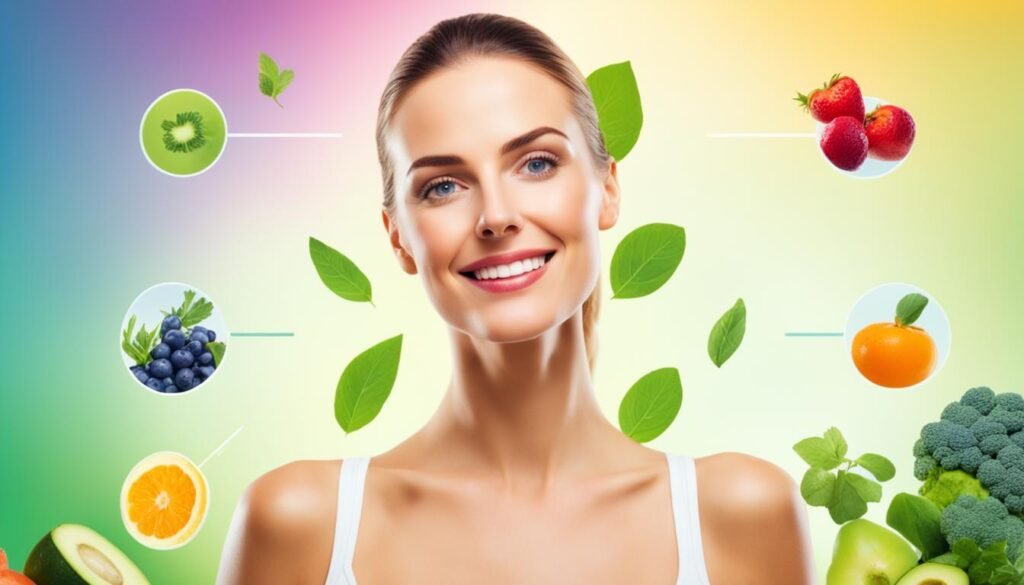
Quitting alcohol can have a remarkable impact on the health and appearance of your skin. By eliminating alcohol from your routine, you allow your skin to undergo a rejuvenation process, resulting in numerous benefits that contribute to a brighter, healthier, and more youthful complexion.
One of the primary benefits of quitting alcohol is skin rejuvenation. Alcohol consumption dehydrates the skin and deprives it of essential nutrients, leading to dryness, dullness, and an increased appearance of wrinkles. When you quit alcohol, your skin rehydrates and regenerates, restoring its natural glow and improving its overall texture.
Furthermore, quitting alcohol can significantly reduce inflammation in the skin. Alcohol consumption often leads to redness, irritation, and the exacerbation of skin conditions like rosacea. By eliminating alcohol, you minimize the risk of these inflammatory reactions, resulting in a calmer, more even-toned complexion.
Another marvelous benefit of quitting alcohol is the reduction of skin issues such as dryness, sagging, and breakouts. Alcohol is known to dehydrate the skin, causing it to lose elasticity and become more prone to dryness and sagging. Additionally, alcohol can stimulate excess sebum production, leading to clogged pores and breakouts. Without alcohol in your system, your skin maintains better moisture levels, resulting in a supple, plump appearance, and reduced breakouts.
Lastly, by quitting alcohol, you significantly decrease the risk of developing skin conditions associated with alcohol consumption. Conditions like rosacea, which are often aggravated by alcohol, can be minimized or avoided altogether. With alcohol out of the equation, your skin becomes less susceptible to these conditions, allowing for improved skin health and appearance.
The Benefits of Quitting Alcohol for Skin:
- Promotes skin rejuvenation and natural glow
- Reduces inflammation and calms the skin
- Prevents dryness, sagging, and breakouts
- Minimizes the risk of skin conditions like rosacea
Overall, the benefits of quitting alcohol for your skin are immeasurable. By prioritizing your skincare and well-being, you’ll experience the incredible transformation that comes with an alcohol-free lifestyle.
| Benefits of Quitting Alcohol for Skin | Description |
|---|---|
| Promotes skin rejuvenation | By eliminating alcohol, the skin can rehydrate and regenerate, resulting in a brighter and healthier complexion. |
| Reduces inflammation | Quitting alcohol minimizes the risk of redness, irritation, and skin conditions associated with inflammation. |
| Prevents dryness, sagging, and breakouts | Without alcohol, the skin maintains better moisture levels, leading to reduced dryness, improved elasticity, and fewer breakouts. |
| Minimizes the risk of skin conditions | Quitting alcohol decreases the likelihood of developing skin conditions like rosacea, improving overall skin health and appearance. |
Alcohol Detox for Skin Improvement
An alcohol detox can have remarkable benefits for your skin. By abstaining from alcohol, you give your skin the opportunity to rehydrate, regenerate, and enhance its overall health and appearance. During an alcohol detox, the body flushes out toxins, promotes cell renewal, and delivers vital nutrients to the skin, resulting in a brighter complexion, reduced inflammation, and a more youthful look.
Quitting alcohol also significantly reduces the risk of developing various skin conditions and improves the skin’s ability to fight off infections. With a proper alcohol detox, you can experience the rejuvenation and revitalization your skin deserves.
The Benefits of Alcohol Detox for Skin Improvement:
- Promotes hydration and water balance in the skin
- Enhances cell regeneration and turnover
- Delivers essential nutrients and vitamins to the skin
- Reduces inflammation and redness
- Improves overall skin health and appearance
- Strengthens the skin’s natural defense against infections
- Helps in achieving a brighter, healthier, and more youthful complexion
Embarking on an alcohol detox journey can be a significant step towards achieving the skin you desire. By eliminating alcohol from your lifestyle, you empower your skin to thrive and rejuvenate.
How to Give Up Drinking

Giving up drinking can be challenging, but with the right strategies and support, it is possible to quit alcohol and experience the benefits for your skin and overall well-being. Here are some tips to help you on your journey to sobriety:
- Put away alcohol: Remove any alcoholic beverages from your home and environment to eliminate temptation.
- Recruit support: Seek the support of a friend, loved one, or a support group who can provide encouragement and hold you accountable.
- Plan sober activities: Find alternative activities to fill your spare time and distract yourself from cravings. Engage in hobbies, exercise, or spend time with non-drinking friends.
- Stay hydrated: Drink plenty of water to keep your body and skin hydrated, which can help reduce withdrawal symptoms and cravings.
- Find alternatives: Discover non-alcoholic drinks that you enjoy to replace the habit of drinking. Experiment with mocktails, flavored sparkling water, or herbal teas.
- Utilize apps: Take advantage of the many apps available that can help you track your progress, connect with a supportive community, and provide motivational resources.
“Quitting alcohol requires dedication and support. Surround yourself with people who uplift and encourage you on your journey to sobriety.”
Remember, the path to sobriety is unique to each individual. Take it one day at a time and celebrate each milestone. With commitment and the right support system, you can successfully give up drinking and experience the positive impact it has on your skin and overall health.
Considerations for Heavy Drinkers
Quitting alcohol can be a challenging process, especially for heavy drinkers. It’s important to approach it with caution and seek professional help to ensure a safe and successful transition. Abruptly quitting alcohol without proper guidance can have severe consequences, including life-threatening withdrawal symptoms.
If you’re a heavy drinker looking to quit, it is highly recommended to enroll in a medically monitored detox program. This program offers a structured environment where healthcare professionals can monitor your progress, manage withdrawal symptoms, and provide the necessary support and guidance throughout the process.
Consulting with an expert or healthcare professional is crucial to assess your drinking habits and determine the best course of action for quitting alcohol. They can tailor a treatment plan that caters to your specific needs and ensure a safe and effective recovery.
“Quitting alcohol abruptly without professional guidance can be dangerous for heavy drinkers. Seeking medical supervision is essential to manage potential severe withdrawal symptoms and ensure a safe and successful recovery.”
Remember, quitting alcohol is a journey that requires patience, perseverance, and professional support. By taking the necessary precautions and seeking help, heavy drinkers can successfully quit alcohol and embark on a path to a healthier and happier life.
The Link Between Alcohol and Skin Cancer
While the relationship between alcohol consumption and skin cancer is still being studied, some research has shown a potential casual link between the two. However, other studies have produced varying results, making the connection between alcohol and skin cancer unclear. Further research is needed to fully understand the impact of alcohol on skin cancer risk.
Regardless of alcohol consumption, it’s important to prioritize sun protection and undergo regular skin screenings to detect any potential signs of skin cancer early. These measures are crucial for maintaining skin health and preventing any potential risks.
To learn more about the connection between alcohol and skin cancer, keep an eye out for ongoing research and consult with healthcare professionals for the latest information and guidance.
If you have any concerns about your skin health or potential risk factors, don’t hesitate to reach out to a dermatologist or medical professional for personalized advice and recommendations.
The Impact of Alcohol on Skin Inflammation
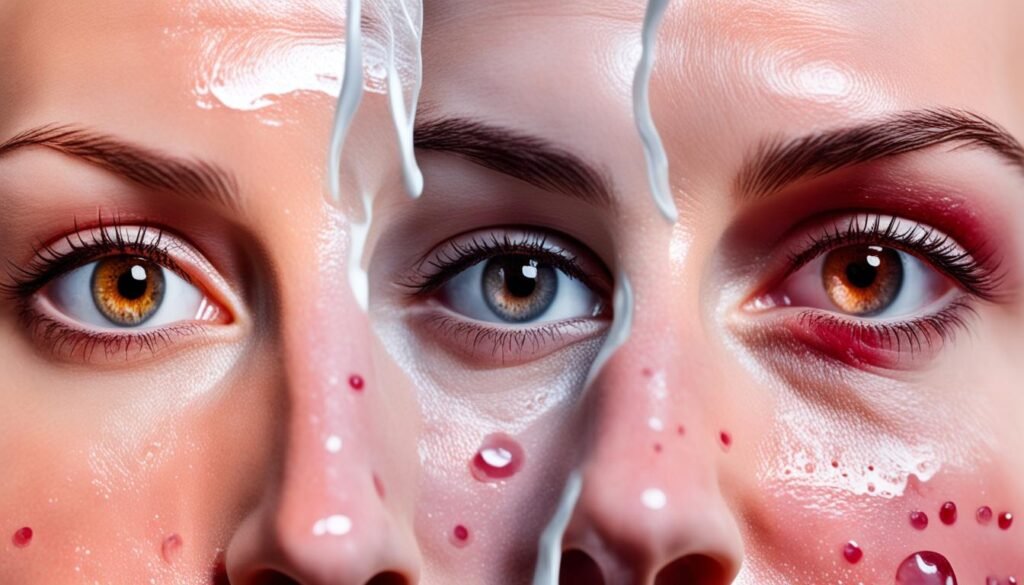
Alcohol consumption can have a significant impact on skin inflammation, leading to redness and the exacerbation of skin conditions such as couperose and rosacea. When alcohol is consumed, it dehydrates the skin, disrupts natural hormone levels, and dilates peripheral blood vessels, all of which contribute to inflammation.
Excessive alcohol consumption can lead to chronic inflammation, a condition that has been linked to various health issues, including skin disorders. Inflammation in the skin can manifest as redness, swelling, and increased sensitivity. It can also worsen existing skin conditions, making them more difficult to manage and treat.
By quitting alcohol, individuals can reduce skin inflammation and improve overall skin health. Removing alcohol from your lifestyle allows the skin to rehydrate properly, maintaining its natural moisture balance. This, in turn, helps to soothe redness and minimize the symptoms of skin conditions associated with inflammation.
Additionally, quitting alcohol can also promote skin cell regeneration and renewal, leading to a healthier and more resilient complexion. By eliminating alcohol-induced inflammation, the skin is better able to repair and regenerate, resulting in improved skin texture and appearance.
Furthermore, avoiding alcohol can have a positive impact on the body’s hormonal balance, which plays a crucial role in skin health. Alcohol consumption can disrupt hormonal levels, leading to increased oil production and the development of acne. By quitting alcohol, individuals may experience a reduction in breakouts and the overall improvement of their skin condition.
Overall, quitting alcohol can significantly reduce skin inflammation, promote hydration, and improve the overall health and appearance of the skin. By eliminating alcohol-induced inflammation, individuals can experience a reduction in redness and an improvement in the appearance of skin conditions related to inflammation.
| Effects of Alcohol on Skin Inflammation | Effects of Quitting Alcohol on Skin Inflammation |
|---|---|
| Dehydrates the skin | Promotes proper hydration |
| Disrupts natural hormone levels | Restores hormonal balance |
| Dilates peripheral blood vessels | Soothes redness and reduces swelling |
| Aggravates skin conditions like couperose and rosacea | Minimizes symptoms of skin conditions associated with inflammation |
| Increases oil production and acne development | Reduces breakouts and improves skin condition |
The Effects of Alcohol on Sleep and Skin Health
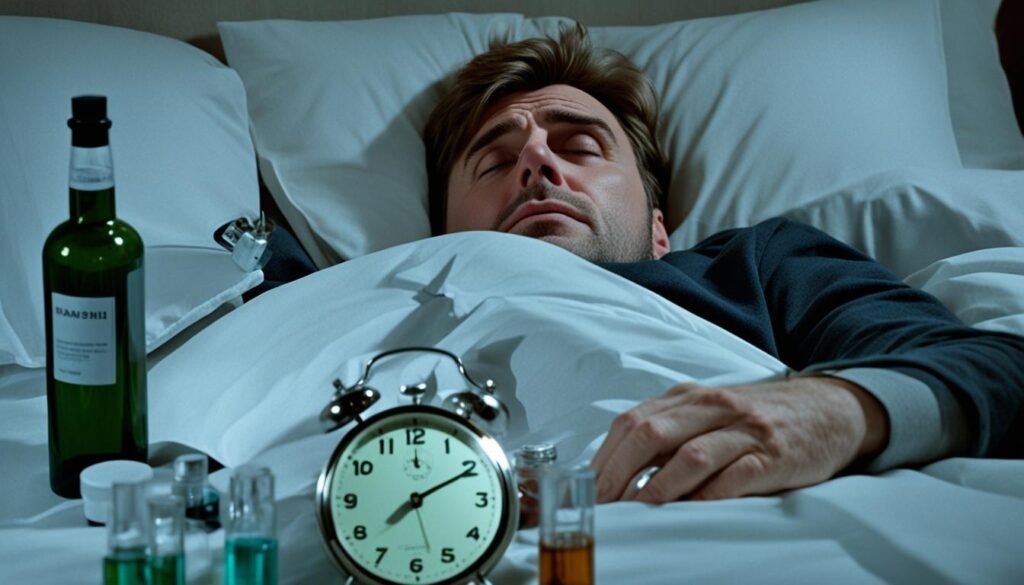
Alcohol consumption doesn’t just have negative effects on our physical health, but it can also disrupt our sleep patterns and impact the health of our skin. When I drink alcohol, it negatively affects the quality of my sleep, preventing me from getting the restorative REM sleep that my body needs. As a result, I often wake up feeling less rested and more prone to mood swings, exhaustion, and even depression.
Not only does alcohol interfere with sleep, but it can also have direct consequences for the health of our skin. Lack of quality sleep can lead to a dull complexion and increased signs of aging, such as fine lines and wrinkles. When I don’t get enough sleep, I can see it in the mirror through a tired, lackluster appearance.
Fortunately, quitting alcohol can have a positive impact on both sleep quality and skin health. When I made the decision to give up alcohol, I noticed a significant improvement in the quality of my sleep. I began to experience deeper, more restful sleep, which translated into waking up feeling refreshed and rejuvenated. This improved sleep quality had a noticeable effect on my skin, as it looked brighter, healthier, and more vibrant.
By eliminating alcohol from my life, I also freed my body from the dehydrating effects of alcohol. This allowed my skin to retain moisture and maintain its natural elasticity, which contributed to a more youthful appearance. Quitting alcohol also reduced inflammation in my skin, resulting in less redness and a clearer complexion.
“Quitting alcohol has been a game-changer for improving both my sleep and my skin health.”
The Connection Between Alcohol and Sleep
Alcohol can disrupt our sleep in several ways. While it might make us feel drowsy initially, it actually interferes with the normal sleep cycle. Alcohol reduces REM sleep, which is the stage of sleep that is critical for memory consolidation, learning, and overall cognitive function. Without enough REM sleep, our brains are not able to properly process and store information, leading to cognitive difficulties the next day.
Additionally, alcohol acts as a sedative that suppresses the central nervous system. It relaxes the muscles in our throat, which can cause snoring or worsen sleep apnea. These disruptions in breathing during sleep can further impair the quality of our rest, leaving us feeling tired and groggy in the morning.
“Quitting alcohol has allowed me to achieve a better quality of sleep, which has enhanced my overall well-being.”
The Impact of Alcohol on Skin Health
Alcohol not only affects our sleep but also takes a toll on the health of our skin. When we consume alcohol, it dehydrates the body, including our skin. This dehydration can lead to dryness, flakiness, and a dull complexion. Over time, chronic alcohol consumption can even contribute to the development of premature wrinkles and fine lines.
Moreover, alcohol can increase the production of inflammatory markers in our body, leading to a heightened state of inflammation. Inflammation is a key driver of various skin conditions, including acne, rosacea, and eczema. By giving up alcohol, we can reduce inflammation in the body, which in turn promotes healthier, clearer skin.
The Benefits of Quitting Alcohol for Sleep and Skin
Quitting alcohol has numerous benefits for both sleep and skin health:
- Improved sleep quality, resulting in feeling more rested and refreshed
- Enhanced skin hydration and elasticity, leading to a more youthful appearance
- Reduced inflammation in the skin, resulting in clearer, healthier complexion
- Decreased signs of aging, such as fine lines and wrinkles
| Effects of Quitting Alcohol | Sleep | Skin Health |
|---|---|---|
| Improved Sleep Quality | ✓ | |
| Increased Skin Hydration | ✓ | |
| Reduced Inflammation | ✓ | |
| Decreased Signs of Aging | ✓ |
No longer relying on alcohol for relaxation and sleep can lead to more restful nights and improved overall well-being. By quitting alcohol, I’ve witnessed firsthand the positive impact it has had on my sleep quality and skin health. Waking up feeling revitalized and seeing the improvements in my skin has been truly rewarding.
“Quitting alcohol has been one of the best decisions I’ve made for my sleep and skin health. I feel and look better than ever.”
Conclusion
Quitting alcohol can have a transformative effect on skin age and overall skin health. Alcohol consumption deprives the skin of necessary nutrients, dehydrates it, and contributes to various skin issues, including wrinkles, sagging, and inflammation. However, by giving up alcohol, individuals can experience significant improvements in skin hydration, regeneration, and appearance.
Not only does quitting alcohol enhance skin health, but it also reduces the risk of developing skin conditions. Additionally, it promotes better sleep quality, which can lead to a more rested appearance and improved overall skin health. Moreover, quitting alcohol may even contribute to weight loss and an elevated mood.
Considering these numerous benefits, participating in Dry January or quitting alcohol altogether can be a game-changer for achieving youthful and healthy-looking skin. By prioritizing their skin’s well-being and choosing to abstain from alcohol, individuals can witness remarkable improvements in their skin’s hydration, texture, and overall appearance. So start your journey towards vibrant and rejuvenated skin today by making the conscious decision to quit alcohol.
FAQ
Can quitting alcohol improve skin age?
Yes, quitting alcohol can have a positive impact on the aging process of the skin. Alcohol dehydrates the skin and deprives it of necessary nutrients, leading to dryness, wrinkles, and an overall aged appearance. By giving up alcohol, the skin can rehydrate and regenerate, resulting in a brighter and healthier complexion.
How does quitting alcohol affect skin health?
Quitting alcohol allows for skin rejuvenation, as the body can rehydrate and the cell renewal process can resume. This promotes hydration, cell renewal, and the delivery of necessary nutrients, resulting in a brighter, healthier, and more youthful complexion. Quitting alcohol also reduces inflammation and the risk of skin conditions like rosacea.
Can quitting alcohol reverse the effects of skin aging?
Yes, quitting alcohol can reverse the effects of skin aging. Alcohol accelerates the aging process by reducing cell renewal and causing dehydration, which leads to a dull complexion, dryness, loss of elasticity, and the appearance of wrinkles. Quitting alcohol allows the skin to rehydrate, regenerate, and improve its overall health and appearance.
How does alcohol impact skin appearance?
Alcohol negatively impacts skin appearance by causing inflammation and dehydration, which lead to dryness, sagging, and increased pore visibility. It can also exacerbate skin conditions such as couperose and rosacea. Furthermore, alcohol can increase hormone levels in women, leading to excess sebum production and breakouts.
What are the benefits of quitting alcohol for skin?
Quitting alcohol has numerous benefits for the skin. It promotes hydration, cell renewal, and the delivery of necessary nutrients, resulting in a brighter, healthier, and more youthful complexion. Quitting alcohol also reduces inflammation, improves skin’s ability to fight off infections, and reduces the risk of skin conditions. It can also lead to better sleep, weight loss, and an improved mood.
How can an alcohol detox improve skin?
Undergoing an alcohol detox can greatly benefit the skin. By abstaining from alcohol, the skin can rehydrate, regenerate, and improve its overall health and appearance. An alcohol detox allows the body to flush out toxins, promote cell renewal, and deliver necessary nutrients to the skin. This can result in a brighter complexion, reduced inflammation, and a more youthful appearance.
What are some tips for giving up drinking?
Giving up drinking can be challenging, but there are several strategies that can help. Putting away or removing alcohol from your environment, recruiting a support system, planning sober activities, staying hydrated, finding alternative non-alcoholic drinks, and utilizing apps for tracking progress and connecting with a community can all aid in successfully giving up alcohol and reaping the benefits for skin health and overall well-being.
What should heavy drinkers consider when quitting alcohol?
It is important for heavy drinkers to seek professional help in a medically monitored detox program to ensure safe withdrawal from alcohol and manage potential severe withdrawal symptoms. It is recommended to consult with an expert or healthcare professional to assess drinking habits and determine the best course of action for quitting alcohol and achieving recovery.
Is there a link between alcohol and skin cancer?
The relationship between alcohol consumption and skin cancer is still unclear and the subject of ongoing research. Some studies have shown a potential casual link between alcohol and an increased risk of skin cancer, while others have produced varying results. It is essential to practice sun protection and undergo regular skin screenings regardless of alcohol consumption.
How does alcohol impact skin inflammation?
Alcohol contributes to skin inflammation by dehydrating the skin, disrupting natural hormone levels, and dilating peripheral blood vessels. This can lead to redness and aggravation of skin conditions such as couperose and rosacea. Quitting alcohol can reduce skin inflammation, promote hydration, and improve overall skin health.
What is the impact of alcohol on sleep and skin health?
Alcohol negatively impacts sleep quality, disrupting the body’s natural sleep patterns and preventing restorative REM sleep. This can result in feeling less rested and can contribute to mood swings, exhaustion, and depression. Lack of quality sleep can also affect skin health, leading to a dull complexion and increased signs of aging. Quitting alcohol can improve sleep quality, resulting in a more rested appearance and improved overall skin health.

